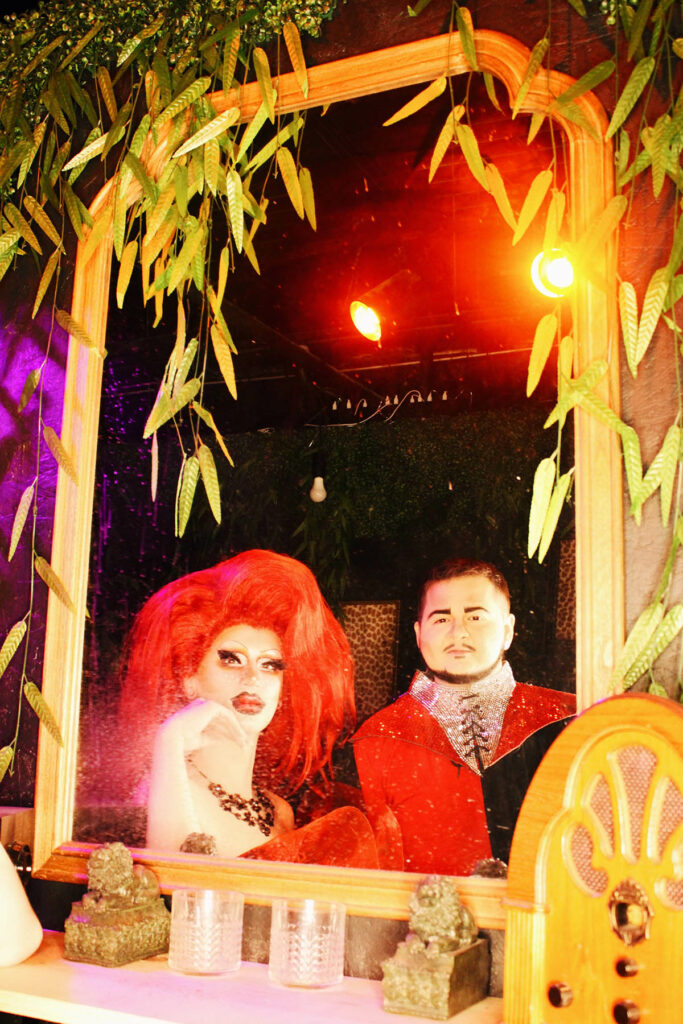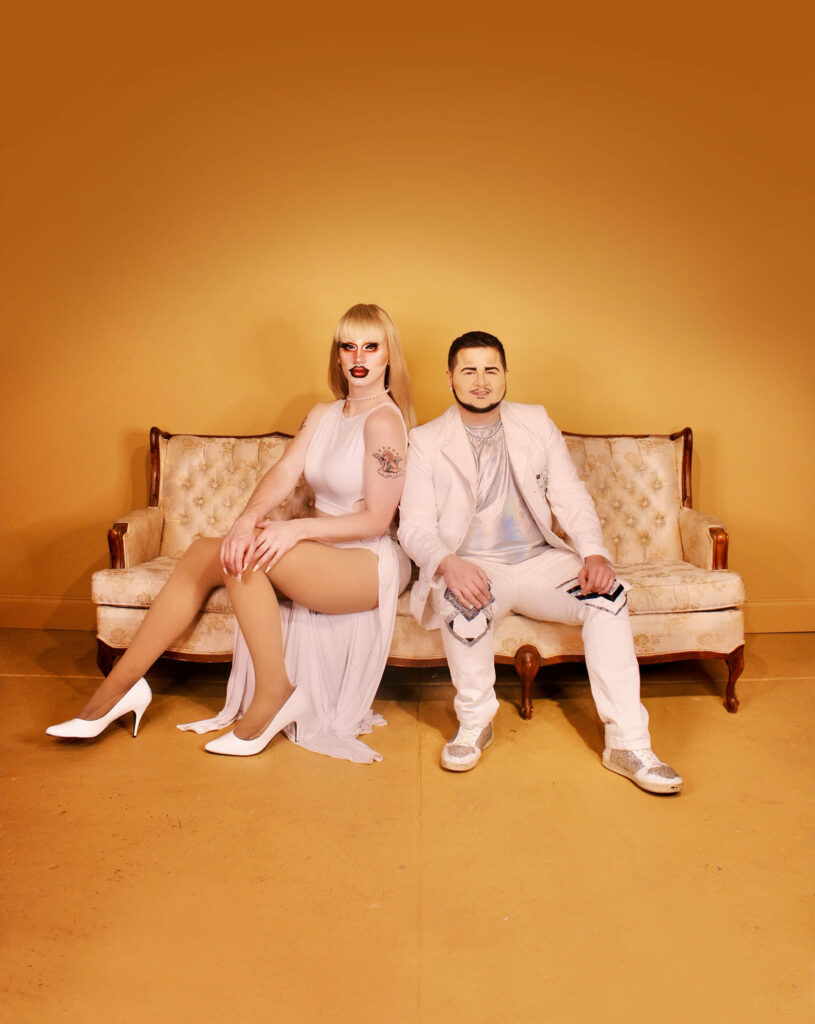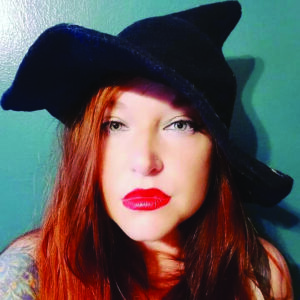Share a little bit about yourselves.
Brenda: My name is Brenda Newport, and I’m nonbinary, gender fluid. I’m not trans however, and I am a drag queen. Performance is an extension of my authentic self. I use she/ her pronouns.
Will: My name is Will Ryder, and I’m a trans gay man. I use he/him pronouns.
How did you two meet?
WR: We met at Dru’s doing shows. We had interacted some at gigs. We were sitting beside each other, and Brenda was about to go on stage. She had on a Girl Scout outfit, but it was SO wrinkly.
BN: Will asked “do you mind taking off your shirt so I can steam it”? And I just said “uh, it’s ok, it’s fine!” but he so politely persisted. He was so kind and helpful, he even said “I always have my steamer, you can reach in my bag and just grab it”. It was a very sweet and thoughtful moment.
What has gender identity exploration looked like for you two?
WR: I feel very comfortable sharing about my transition story, and it’s come a long way. Always connected to male things but never had a term for it until I was older. I guess tomboy was the best term I had at the time. The only way I knew about different gender expressions was on the show Cops… it was always poking fun at transwomen sex workers. And those weren’t the best terms or understanding for my younger self. Then I watched “The L Word.” A character named Max was a transman getting testosterone through the black market but was taking too much and became angry. It was a cisgender woman playing the character at the time so the voice never changed and he had a fake beard. I didn’t really get a chance to see a healthy transman experience and realistic lifestyle. The way it was displayed to me made me question whether or not I would want to go down that route because I’d be more of a target. It wasn’t until I competed in the Drag King USofA pageant and met trans guys that I saw more real life experiences. They were nice, helpful and supportive. I did about 3-5 years of research and finally came around to myself on this. I made the doc appointments to go to therapy and began hormone replacement therapy on July 27, 2017. I hadn’t come out to my parents yet about being a transman. I waited until 2019. I was hiding my voice and shaving peach fuzz. They have always been supportive before and after my transition, I was just nervous about coming out again I suppose. It was easier than most trans experiences maybe because my mom and dad were already using he/him pronouns for Will. I made a shirt for pride that said, “I’m tired of only being myself for the weekend, will you accept me as your full time son”. Then, I gave them a trans flag and was on stage being Will full-time with their entire support.
BN: I don’t have a particularly heartwarming story when it comes to the parenting relationship like Will, but it’s been a journey. I grew up in a very conservative household and that, in a way, thrusted me into later-in-life growth to become myself. I was put in a box when I was younger and was expected to be the standard; like, to play sports, and any expression of femininity was frowned upon. The thing is, I’ve never been able to hide who I am very well. Three days after I turned 18, I got an apartment in midtown, and threw myself into liberal and open and queer environments. I knew I was gay, and I had been out for a while, but it wasn’t until my adult years that I came into my queerness and sexuality. I almost had an aversion to being myself as a queer person in my younger years. I love being queer, it took a long time to find my whole self. I found drag through Moth’s shows at Growlers. I was so infatuated with drag and Moth; she is so out there and charismatic and mystical. And drag is so fun, it lets people express their feelings and concepts of gender. I saw that as an opportunity to follow suit after Moth; I showed up in full drag and watched her shows and waited for her to see me. Eventually she asked me to join a show and perform with her. And I fell in love with it. It felt good to hear people say “we gotta keep an eye on that one”. I got to use my background in theater characterization and find the art of it. I put my nose to the grind and elevated my drag. Drag and fellow queer people using open terms like “nonbinary” made me feel so seen and celebrated. I’ve always had feminine urges and feelings, but I never had a chance to express myself like that until drag and to be able to say “it’s ok, I can be masculine and feminine. I don’t have to put myself in a box. I can float between!”

From the outside looking in, folx may not know some of the challenges that LGBTQ+ couples could experience in society. What could you share with allies and even fellow LGBTQ+ on how to be better supporters, especially in the South?
WR: An important thing is that asking questions isn’t always a bad thing if you’re coming from a genuine place, like asking pronouns. There are lines you don’t cross, like asking about genitalia or what surgeries a person has gone through. Precluding that, you wanting to ask questions can help trans people and couples too. It’s also possible that a trans person doesn’t feel comfortable talking to a cis person about certain things. So that is important to keep in mind.
BN: It’s complicated for folks who aren’t queer to educate themselves or know where to go because one queer person isn’t the encyclopedia of all queer experiences. It’s expansive but also very personalized. The most important thing for me is that the person trying to learn has genuine intentions; I think that makes it easier for everyone. You’re never too old to learn!
WR: Transmen can’t change their gender marker on their birth certificate in Tennessee. That has affected a lot of close friends. I was born in Philly, so I have the option to change mine but not having that opportunity makes it hard for other guys to get other types of legal documents like passports. We are impacted by legislative proposals, not just in Tennessee but federally. Think about the problematic bathroom bills and how it’s an already uncomfortable experience for trans and nonbinary people. Sometimes I have to use a buddy system where Brenda goes ahead of time to navigate and assess if there are others in there, stalls, or doors, or privacy. We just want to use the restroom.
BN: The bathroom experience shouldn’t be this dreadful situation where we feel like we have to navigate with the public because of misconceptions or judgments. You know, Pride weekend just happened, and I saw a lot of parents with kids. It reminds me just how important it is for parents to not hinder who their children authentically are, how they experience and express gender, or see how others express themselves at a family event like a parade. A lot of growth happens in queer children, personal or artistic, when parents allow them to be themselves or see others being themselves. For example, the Republican state representative who is proposing a law to keep kids away from drag performers is preposterous. It’s a waste of energy, and unfair to call drag performers perverse when there are so many safe spaces for families in performance.

Performing arts can be very important for expression and connection. Can you share how performance upholds your sense of self and maybe your connections as a couple?
BN: It’s cathartic, and you don’t have a chance to do that in your everyday life–to to express emotions, good or bad. There are times when I’ve felt overcome with joy, and I want to put it out there and share it with others. It’s so wonderful to be with someone who gets what I do, like running around and connecting and bonding with the audience and living this layered life of a performer. We’ve both had hiccups in previous lives with other people who may not understand this performance life. When you perform, you’re sharing yourself with the audience. It’s us, but it’s a character of ourselves that we create, an illusion or suit of armor for me, sometimes. When I’m in drag, I go right for the stage and talk on a mic; but, if I walked into a room out of drag, it would be different. Will and I are introverts living very extroverted lives; we both yearn for being with the audience and expressing ourselves and performing music that speaks to us but also spend time watching movies and being at home.
WR: Performing and dancing have always been a big part of me. It allows me to connect in more queer spaces but meeting my friends and chosen family have come from that. A drag career isn’t just being on stage, there is time spent networking and mingling and connecting with the audience and exchanging those heartfelt moments. I’ve heard people say “I love watching you grow as a person on social media and follow your transition story”. I’m helping a new generation be themselves while also following a legacy of those who gave us the chance to be us. It’s nice to be with someone who knows how this all can work out and what it looks like. We both have a path of performance, but it’s a small part compared to how much time we spend with and celebrate each other.
Will, what’s your favorite thing about Brenda?
WR: We’ve had some shows we hosted together, and it’s great how we connect and banter with each other. It’s fun, but what honestly drew me to Brenda is the fact that she was just herself up there. Her energy was so interesting and real because I connected with her authentic self on stage. She’s always the party of the show and always genuine. It’s so appealing to me to be so full of life and love in the drag world.
Brenda, what’s your favorite thing about Will?
BN: First off, Will is an icon to me and many others. Not just because of the timeline of his career, but the way he carries himself as a polished performer. He’s a star; he’s so impressive. As a person, he’s treated me so kindly…with so much patience and gentleness. He treats me like a delicate flower but also encourages me to be strong. What a balance to achieve!



